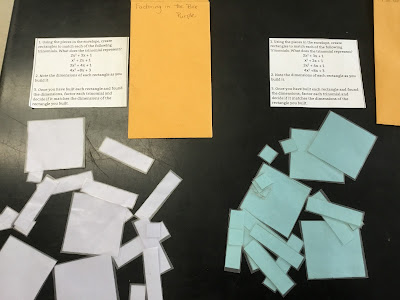As we reviewed factoring I pulled out an exercise I put together when I was working on my Masters...many years ago. This essentially asks students to factor using areas. They build the polynomial into a rectangle and the factors are the dimensions of the sides. Here's a picture of a couple of the solutions.
Here is the document of directions that are in the envelopes with the pieces.
On the second day of class, we did speed dating to practice naming polynomials courtesy of Math = Love. The students really enjoyed the interactions.
I also found this question stack on Sarah Carter's Math Equals Love blog when we were working on simplifying rational expressions. This is a self-checking exercise. Students lay out the cards answer side up. They flip one card over to reveal a question. They solve and search for the answer card. Once they find the answer card, they flip that card over to reveal the next question. If they have simplified correctly, the last answer will be on the other side of the first question.
When we moved onto solving rational equations, we practiced with the following method. I typed out three questions, put them on this divider and then taped it to a large piece of paper. Students worked in groups of three. Each person in the group started with one problem, and a few minutes later I would tell them to rotate. They would then continue working on someone else's problem. I tried to switch twice so each student would work on parts of all three questions.
When we were still working on simplifying rational expressions, we also did a jigsaw. I gave each of the groups of students two of these problems, then once solved, they reformed groups with people they hadn't been with before, and each member in the new group explained their questions to the other group members.
When we worked with simplifying radical expressions, I found this tarsia puzzle I can't remember the source, but I know it was free. I let the students cut up the big triangles and then they worked to figure out how to put the triangles together into one big triangle that put the radicals with their simplified versions.
Toward the end of the unit, I discovered open-middle problems and had these two from the Count it All Joy blog for warming up to absolute value inequalities. There are many possible solutions and the students have to think through their strategy to place each of the numbers since in these exercises the challenge is to only use each of the digits once.










No comments:
Post a Comment